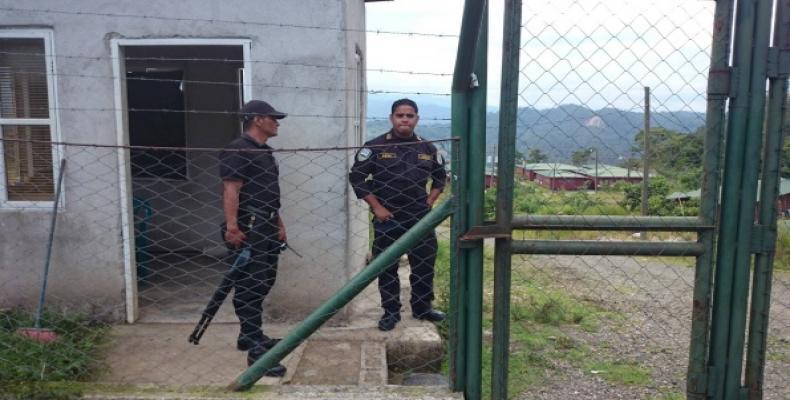Tegucigalpa, December 1 (teleSUR-RHC)-- The Lenca indigenous group mobilizing against the Agua Zarca hydroelectric project in the eastern department of Santa Barbara accused local authorities and the Honduran corporation in charge of the project of systematic violence and repression, Monday.
As the country's largest indigenous group, Lenca leaders organized a peaceful protest in front of the city hall of San Francisco de Ojuera in opposition to the project, which involves a large-scale dam being built on the River Gualcarque without the group’s consent.
However, forces from the National Police intervened as the group were traveling to the site of the protest, stopping the buses transporting the activists and building two-meter ditches in order to prevent the group from continuing their journey, claimed the Civic Council of Popular and Indigenous Organizations of Honduras (COPINH) in a statement.
COPINH also confirmed that it has filed a lawsuit against the DESA Corporation as well as city mayor Raúl Pineda, who they accuse of being responsible for the intervention.
The indigenous activists were eventually able to continue their journey to San Francisco de Ojuera after filling the ditches with branches and other debris. However, upon arrival to the city hall they were attacked by a “small but very aggressive group of 10 people” including the city’s vice-mayor, protest leader Berta Caceras told teleSUR.
The group of about 200 activists continued their journey to the river in order to evaluate the extent of environmental damage caused by the project, according to Caceres. Despite the presence of private security and national police, the activists managed to enter the facilities of the plant, which is the second of its kind after the first was canceled due to previous mobilizations.
Commenting on the situation inside the facility, Caceres said the group received “threats” from the officers, with one guard pointing his gun at the activists.
Caceres has led the mobilization against the project since April 2013, when the Lenca activists were able to force authorities to cancel the building of a first plant on the river. The group also claim responsibility for forcing the withdrawal of Sinohydro, a Chinese subcontractor from the project, as well as the World-Bank affiliated International Finance Corporation, who have expressed concern over potential human rights violations.
Despite this, other foreign bodies continue to contribute to the project, including German multinational Siemens and Voith Hydro. The Dutch development bank FMO and the Finnish government are also contributing resources, said Caceres.
The Honduran government along with DESA argue that the second plant is located in a different department to where the Lenca are based, therefore it does not directly affect the group. Caceres dismissed the comments, pointing out that the Lenca people are not confined to a single department.
UN Special Rapporteur Victoria Tauli-Corpuz visited the site of Rio Blanco earlier in November, handing a damning report to the Honduran government which described “the critical situation” the department’s indigenous people are facing. The report slammed the government for “violence, impunity and corruption” and its violation of indigenous rights to “land, territories and natural resources,” including a “lack of basic social services like education and health.”
Caceres told teleSUR that the level of impunity in Honduras is “absolutely stunning,” pointing to the “disgusting racist and sexist insults” authorities and members of the public continue to apply to indigenous activists. The hearing of military officers involved in the killing of Tomas Garcia, a COPINH leader who died in July 2013, is set to begin on Friday.
According to a recent report issued by Global Witness, the number of concessions the Honduran government granted to energy companies skyrocketed following the 2009 coup against President Manuel Zelaya, including the Agua Zarca project. The criminalization and murder of indigenous activists has also increased over the past six years.


